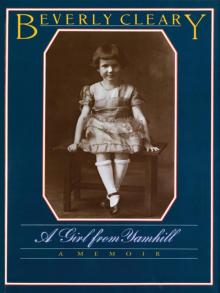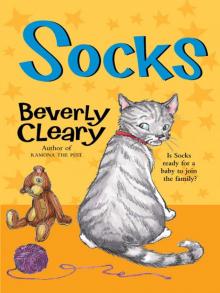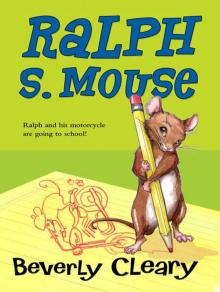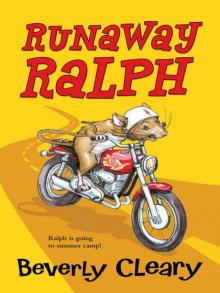- Home
- Beverly Cleary
The Luckiest Girl Page 7
The Luckiest Girl Read online
Page 7
Even a football game seemed like an entirely new experience for Shelley. The rooting section of the home team courteously faced the sun, allowing the visitors the scant shade of their own shadows. Shelley licked a Popsicle and acquired a sunburn while she cheered for her team. At home she would have worn her raincoat and tried to warm her hands on a soggy hot dog while she wished that she were part of the rooting section.
And then there was the Bastion, so different from her school paper at home, which mentioned the names of the same students over and over as if, by writing the names of these popular students, the reporters hoped that they, too, would become popular. Shelley’s name had always appeared in the honor roll and once it had appeared in the gossip column when she and Jack began going steady, but never had she been interviewed.
That was why she was so pleased when a boy stopped by her locker one afternoon and said, “Hi, Shelley. I’m the Roving Reporter this week and I am interviewing new students. Can you spare a couple of minutes?”
“Hello, Rover,” said Shelley, flattered that she had been chosen. “I’d be delighted.”
“R-ruf!” answered the boy. “Tell me, as a new student, what do you think of San Sebastian High?”
“I think it is marvelous,” answered Shelley. “Everyone is so friendly.”
“What specifically do you like about the place?” the reporter wanted to know.
Shelley knew from reading the paper that a serious answer was not expected of her. The sight of her locker gave her an idea—not a very good idea, but all she could think of at the moment. “I like the cunning little lockers arranged in two tiers in the halls,” she answered. “Where I came from we had to have long lockers to hold our slickers and boots.”
“Boots!” exclaimed the boy. “Then it isn’t true that the entire population of the state of Oregon is born with webfeet?”
“Of course we have webfeet,” answered Shelley. “We just keep them dry, is all.”
The boy made notes on a pad of paper. “Is there anything else you like about San Sebastian High?”
“Lots of things,” answered Shelley, stumped for the right sort of answer.
“Such as?” prompted the boy.
The only Roving Reporter interview that Shelley could recall very clearly was the interview in which Philip, or rather Frisbie, had referred to her. This gave her an idea. “Specifically, I like basketball players who take biology,” she answered with unaccustomed daring.
“Basketball players, biology,” muttered the reporter, and flashed a grin at Shelley. “Thanks a lot. That should fill up my space.”
“You’re welcome,” answered Shelley with a smile, and turned to her locker. Had she done the right thing? she wondered. Maybe Philip wouldn’t like a girl who practically threw herself at him in the school paper. Maybe he would be embarrassed. But what was a girl supposed to do when a boy was shy? She had to do something and there was a chance this might work.
“Hi, Shelley,” said Hartley unexpectedly. “You look as if you thought something exciting was about to happen.”
“In San Sebastian, who knows?” said Shelley. Hartley grinned and walked on down the hall, and Shelley watched until he turned the corner. Sometime she must find a way to explain about Katie on the refrigerator….
Half hoping the reporter would not use her statement, Shelley nervously awaited the next issue of the Bastion. When she received her copy she turned with trembling hands to the Roving Reporter column. There it was, her name in print. Her eye skimmed through the paragraph. She was almost afraid to look at the last sentence. “‘I like basketball players who take biology,’ confessed this pert L-11 miss.”
Her remark had been printed and there was nothing she could do about it now. Seeing the words in black and white made Shelley regret her statement to the reporter. She had been too bold, she was sure. And what would Tom and Mavis think when they read the paper? And what if Mavis happened to mention the story when she wrote to Shelley’s mother—or even send her the clipping? Well, anyway, Shelley told herself ruefully, it had seemed like a good idea at the time.
When the next biology period arrived, Shelley dreaded facing Philip. She lingered at her locker as long as she dared, hoping that if she entered the room just as the class started she could avoid talking to Philip a little longer. Unfortunately Shelley underestimated the time it would take her to reach the laboratory.
Mr. Ericson had already begun to talk when she entered the room. He was silent as he looked directly at Shelley, who was trying to slip inconspicuously into her chair. Then he said to the class, “May I introduce the late Shelley Latham?”
Shelley’s face was crimson and she did not move her eyes from the initials inked on the cover of the notebook she had laid on the table in front of her. The late Shelley Latham! Why did Mr. Ericson have to be so sarcastic all the time anyway? She was so annoyed with her teacher that for once she did not feel drowsy in the afternoon heat.
“Hi, Webfoot,” whispered Philip under cover of the laughter of the class.
Shelley did not dare look at Philip. She could not risk any more of Mr. Ericson’s sarcasm. The next seventy-nine minutes of laboratory were difficult for Shelley. She tried to give the appearance of concentrating on algae and fungi so that she would not attract Mr. Ericson’s attention. Actually, she was considering the implications of the words “Hi, Webfoot.” For one thing, they told her that Philip had read the interview. But Webfoot? Did Philip, like Mr. Ericson, mean to be sarcastic? No, she was sure he did not. He had sounded as if he were teasing in a friendly way.
Shelley clamped a slide under her microscope and prepared to draw a picture of a protococcus. Philip would never be sarcastic like Mr. Ericson. She turned the knob that adjusted the microscope and peered through the finder with her right eye until the one-celled plant came into focus. Then she looked through the microscope with her left eye and at the same time tried to look at her paper with her right eye. Mr. Ericson said that was the proper way to use a microscope, but Shelley felt as if her eyes were going off in different directions. To rest them she let both eyes stray to Philip.
“Shelley,” said Mr. Ericson, “can you tell us how fission plants differ from thallus plants?”
“Um…” said Shelley, taken by surprise. “A fission plant…I’m sorry. I don’t know.”
“Philip?” asked Mr. Ericson.
“No, sir,” answered Philip. “I don’t know.”
Jeannie knew. Quick, bright-eyed Jeannie always knew the answers.
Somehow Shelley got through the rest of the laboratory period. As she put away her microscope and closed her notebook, Philip turned to her with his lopsided grin and said, “So long, Webfoot.” As usual, he left the room with Frisbie.
“Aren’t boys maddening?” asked Jeannie sympathetically.
“Yes,” agreed Shelley, and decided she had better forget about Philip before she became the laughingstock of the whole school—if she was not already. She was ashamed of what she had done. When Philip was interviewed he had not said he liked her. Frisbie had said it for him, perhaps meaning it as a joke that she had been foolish enough to take seriously because she had wanted it to be true. She had been so sure that life in San Sebastian was going to be perfect and now she had made a mess of everything.
That afternoon after school Shelley wrote a long letter to her mother and father, telling them about her studies and the success of the doughnut hole sale and the fun she was having with the Michies.
When she had sealed the letter she started a second letter. “Dear Rosemary, San Sebastian is simply perfect! And guess what? Remember that cute boy I told you about who sits next to me in biology? Well, now he calls me Webfoot! How’s that for a nickname?” Shelley did not really feel the enthusiasm she was displaying in her letter, but she felt that since she had written so much about Philip in a previous letter to her best friend, she should mention him again. Webfoot was really not a promising nickname. A boy who liked a girl a lot would not call he
r Webfoot. Because Philip was important to her, she did not even think of him as Phil. He was Philip, and if she were important to him he would call her Shelley. Webfoot was a nickname for a girl who was a pal. Well, she didn’t want to be a pal to Philip. She might as well forget him as she had decided once before that afternoon. Slowly Shelley tore the letter to bits and sprinkled the pieces into the wastebasket.
At supper that evening Katie announced, “Shelley was interviewed in the Bastion. I was looking at Luke’s paper and I saw the interview.”
“Oh, that silly thing,” said Shelley hastily. She was not eager to have Tom’s and Mavis’s attention called to her bad judgment. Mavis might even feel she had to speak to Shelley about it.
“Shelley said she liked basketball players who take biology,” persisted Katie. “And they put it in the paper. And you know what? Philip Blanton plays basketball and takes biology!”
Shelley felt herself blushing. She was thoroughly ashamed of the example she had set Katie. She glanced at Tom and Mavis, who did not seem particularly concerned with the turn of the conversation. Mavis, with two children of her own, could not concern herself with Shelley’s small problems. It was different at home, where Shelley’s mother had only one child to think about. “Katie, I shouldn’t have said what I did,” said Shelley. “It was a stupid thing to do and I’m sorry I said it and I’m sorry they printed it.”
“Just the same,” said Katie dreamily, “I hope I get interviewed for the paper when I get to high school.”
Tom turned to his son. “Well, Luke, what’s this I hear about your having trouble in English?” he asked.
“It isn’t fair!” Luke burst out. “Other kids don’t have dads who teach at the same school they go to and hear every single little old thing that happens!”
“What did happen?” asked Tom.
Luke scowled at his plate.
“Yes, Luke, tell us,” Mavis urged.
“Aw…the teacher wrote a bunch of sentences on the blackboard before class and then during class she went right down the row and asked each of us to read a sentence aloud and put the punctuation in,” Luke explained. “When I came to my sentence I didn’t want to do it, is all,” said Luke.
“Why not?” asked Mavis. “Didn’t you know how to punctuate it?”
“Sure I did,” answered Luke, “but I knew if I read it all the kids would laugh. They laughed anyway.”
“What was the sentence?” Tom asked jovially. “You can tell us. You’re among friends.”
Luke spoke rapidly, and without expression. “‘Mother, I cried, ‘they’ve crowned me Queen of the May.’”
Shelley could not help it. A shout of laughter escaped her along with the laughter of the rest of the family.
“See?” said Luke bitterly. “What did I tell you?”
The family made an effort to control its amusement. “Did you finally read it?” asked Mavis.
“She made me,” said Luke. “And then she said I got it right except that if I had been crowned Queen of the May I would be excited and so it should be Queen of the May exclamation point. Boy, that really slayed the class.”
Poor Luke. Shelley sympathized with him even though she could scarcely keep from laughing. She remembered how she had felt that afternoon when she was called “the late Shelley Latham.”
“Luke, do the best work you can and try to be patient with your English teacher,” said Mavis gently. “She obviously doesn’t have a sense of humor and that is something she can’t help.”
“Mother, they’ve crowned me Queen of the May exclamation point!” said Katie dramatically.
“Now, Katie,” warned Tom, “Luke has had enough trouble with that sentence.”
“You know what we had to cook in cooking class today?” asked Katie. “Mush and breakfast cocoa.” She made an expressive gagging noise. “And right after lunch, too.”
Shelley studied the faces around her. The interview no longer seemed so important. This was one of the things she enjoyed most about living with a larger family. When she became absorbed in a problem, someone else came along with another problem and somehow her difficulty lost its importance. At home all her problems were the center of interest.
Saturday morning after breakfast Tom and Luke went out to work in the grove. Mavis went to her studio over the garage and Shelley decided to run the vacuum cleaner in her room. She even moved the bed and was cleaning in the corner when Katie burst into the room.
“Hi,” said Shelley, switching off the vacuum cleaner.
“Shelley!” exclaimed Katie, who was plainly trying to suppress great excitement. “Come down the road with me. I want to show you something.”
“What do you want to show me?” asked Shelly.
“It’s a surprise,” said Katie. “Shelley, you’ve got to come!”
“All right,” agreed Shelley, to please Katie. “How far down the road?”
“Not very far,” said Katie. “Get a bicycle and come on.”
The two girls, accompanied by Sarge, bicycled down the road that bordered the grove, and as they pedaled, Katie chattered. “I can hardly wait until tonight,” she confided. “The dancing class that meets at school once a month is having a hat dance.”
“A hat dance?” asked Shelley. “I thought a hat dance was a Mexican folk dance where the man throws his hat on the floor and stamps his feet around it.”
Katie giggled. “Not this kind. It is our regular dancing class, only everybody is supposed to concoct some sort of château to wear and there will be prizes for the best ones,” answered Katie.
Shelley found this statement puzzling. “Oh, you mean chapeau,” she said when she had figured out Katie’s meaning.
“Well, anyway, a crazy hat,” said Katie. “Mine is a secret. Wait till you see it. I know it will win a prize.”
“Is there some special boy you like?” asked Shelley.
“Could be,” answered Katie mysteriously.
The two girls approached a house that was protected by a windbreak of eucalyptus trees, and as they came near the trees, Shelley heard the sound of sawing.
“Look!” cried Katie triumphantly. “Up there in the wild blue yonder!”
Against the blue sky fifty feet above the ground and half hidden by leaves was Philip. He was leaning away from the tree, his body supported by a lineman’s belt buckled around the trunk, his spiked heels digging into the wood. For a moment Shelley stood staring up, motionless in surprise, before she collected her thoughts and decided to leave quickly before Philip saw her.
From another treetop Frisbie’s voice called out, “Hey, Phil! Here’s the late Miss Latham!”
Philip stopped sawing at a branch and called down, “Hi, Webfoot!”
“Hi.” Shelley had to answer, but she was sure that Philip would think she had found out where he was working and had deliberately ridden out to see him. She realized now, when it was too late, that she should have insisted upon Katie’s telling her what the surprise was. Now, after that silly interview in the paper, Philip would think she was as persistent as—as a bloodhound. Not only had she tracked him down, now she had him treed. Well, she had no intention of sitting there baying at him. “Come on, Katie, let’s go,” she whispered.
“No, let’s watch,” begged Katie.
“Katie, please!” Shelley’s whisper was urgent. Just wait till she got Katie alone! There were a few things she was going to explain to her.
Philip wiped the dust and sweat from his forehead with the back of his hand and went on sawing. The branch broke through and came crashing to the ground in a cloud of dust and a flutter of dry leaves. The sudden loss of the branch made the treetop spring back and forth, and in spite of herself Shelley watched, fascinated. Philip looked so tall and strong up there in the swaying treetop.
“Katie,” Shelley whispered, turning her bicycle around. “You can stay if you want to, but I’m leaving.”
“But you said you liked him.” Katie sounded hurt.
“Katie, yo
u don’t understand.” Shelley mounted her bicycle. “I’ll explain later.”
“Hey, Webfoot,” Frisbie called from a treetop. “Stick around. Phil wants to talk to you.”
“Aw, shut up, Friz,” Shelley heard Philip say in an undertone.
“Go on, ask her,” said Frisbie.
“Sorry, Friz,” Shelley called. “I have things to do.” She gave what she hoped was a jaunty wave and started down the road.
“Shelley, wait!” Philip yelled, loud enough for the whole countryside to hear. “I want to talk to you.”
This from shy Philip? Shelley hesitated, stopped, and looked back up at Philip, who was working his way down the tree trunk. He had called her Shelley, so perhaps he meant what he said. She felt confused and, under Katie’s interested eye, uncomfortable. Darn Katie, anyway.
“You heard the boy,” shouted Frisbie from his treetop.
“You keep out of this, Friz,” said Philip, unfastening the belt and jumping to the ground.
Shelley hesitated. After the way she had behaved she did not want to appear to pounce on him. On the other hand, she really did want to talk to him—terribly. Philip approached her, and even though he was dirty and sweaty he looked clean and healthy underneath the dirt and more wonderful than any boy Shelley had ever known.
“Shelley, may I come over this evening?” he asked.
When Shelley did not answer immediately, Katie whispered, “Go on. Say yes.”
Shelley did not dare hesitate any longer, because there was no telling what Katie would take into her head to say or do. “Yes, I would love to have you come over,” Shelley answered.
“Swell,” said Philip. “I’ll be over about eight.”
“I’ll see you then,” answered Shelley, and pedaled down the road. She did not want to linger and appear too eager, especially when she was so excited that her hands would have trembled if she had not been gripping the handlebars so tightly. She finally had a date with Philip.
Katie rode along beside her. “I knew he would ask you for a date,” she said happily. “I just knew it.”
“Katie—” began Shelley, and stopped because she did not know what to say. It was difficult to scold someone who was so happy for her and she did not know how to explain to Katie that although she was delighted to have a date with Philip, she felt she had done all the wrong things. After all, she was supposed to be a good experience for a girl who had reached a difficult age. She did not want Katie to think a girl should advertise in the school paper that she liked a boy and then go out and tree him. She should try to set the younger girl a good example and so far she had done a poor job. “Katie, it is nice of you to want me to have a date with Philip,” she said tactfully, “but I am afraid he will think I chased him, especially after that awful interview I gave the school paper.”

 Ramona Quimby, Age 8
Ramona Quimby, Age 8 Dear Mr. Henshaw
Dear Mr. Henshaw Beezus and Ramona
Beezus and Ramona A Girl from Yamhill
A Girl from Yamhill Ramona Forever
Ramona Forever Jean and Johnny
Jean and Johnny The Luckiest Girl
The Luckiest Girl Emily's Runaway Imagination
Emily's Runaway Imagination Ribsy
Ribsy Ramona the Pest
Ramona the Pest Socks
Socks Ramona's World
Ramona's World Strider
Strider The Mouse and the Motorcycle
The Mouse and the Motorcycle Henry and the Paper Route
Henry and the Paper Route Ramona the Brave
Ramona the Brave Henry Huggins
Henry Huggins Ramona and Her Mother
Ramona and Her Mother Ralph S. Mouse
Ralph S. Mouse Sister of the Bride
Sister of the Bride Henry and the Clubhouse
Henry and the Clubhouse Muggie Maggie
Muggie Maggie Runaway Ralph
Runaway Ralph Ramona and Her Father
Ramona and Her Father Henry and Ribsy
Henry and Ribsy Henry and Beezus
Henry and Beezus Two Times the Fun
Two Times the Fun Fifteen
Fifteen Mitch and Amy
Mitch and Amy